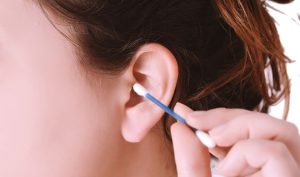Healthy ears contain wax, which is produced by a unique lining in the ear canal. Wax traps dirt, germs, and other irritants to protect the tissues and help prevent infections. The wax continues to travel to the outer ear, where it drains. This process may take up to two months to complete. The normal amount of wax produced varies from person to person. Sometimes wax accumulates in the ear and requires treatment.
The safest approach to cleaning the ears is to see a doctor or other healthcare professional, as they can use specialized tools to safely remove excessive earwax or debris. A doctor can help determine whether other underlying health conditions may need attention.
If a person still wants to clean their ears at home, they can try using a damp cloth. A person can soak a cloth or paper towel in lukewarm water. After squeezing out the excess, they can use a cloth to clean the outer parts of the ears.
Inserting an object into the ear is not a good idea.
Methods to avoid:
Cotton swabs: Avoid removing earwax with cotton swabs. Cotton swab is the most common method used by people to clean their ears at home. Risks of using cotton swabs include:
- Pushing earwax deeper into the ear
- Slows down the natural process of earwax elimination
- Damaging the eardrum
- The swab may get stuck in the ear
Earwax candles: Cleaning the ear with earwax candles involves inserting a cone-shaped wax-coated cloth into the ear canal. The individual then sets the exposed end of the cloth to burn. This method can result in:
- Burns on the skin
- Candle wax blockage in the ear
- Fire at home
- Holes in the membranes between the ear canal and the middle ear
- Bleeding
- Injured eardrum
Inserting any object directly into the ear is definitely not a good idea because it can lead to damage and push earwax deeper down.

When to see a doctor
If a person experiences an earwax blockage and is not comfortable using an at-home cleaning solution, they should see a doctor. A person should see their doctor if they have the following symptoms of an ear infection,
- Pain in or around the ear
- Fluid draining from the ear
- Difficulty hearing
In addition to severe infections, a person should consult their doctor if they experience repeated blockages. The doctor can discuss ways to prevent this from occurring. A person can keep their ears clean and free of blockages by scheduling regular cleanings with their doctor.

